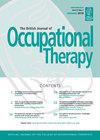Occupational therapy practice to support executive function impairment after acquired brain injury: A UK clinical survey
IF 1.3
4区 医学
Q3 REHABILITATION
引用次数: 0
Abstract
Introduction: This study explored treatment of executive functioning impairment in adults after acquired brain injury (ABI), clinician’s confidence and support received, in a sample of occupational therapists in the United Kingdom. Methods: A 24-item online questionnaire was sent to 750 members of the Royal College of Occupational Therapists Specialist-Section in Neurological Practice. Data was collected at a nominal and ordinal level and included yes/no Likert-type scale and free field comments. Descriptive statistical analysis was completed. Results: Seventy-six occupational therapists working in a range of neurological settings completed the survey. Frequently used interventions included education ( n = 57, 75%), task modification ( n = 56, 73%), instrumental activities of daily living (ADL) ( n = 54, 71%), personal ADL ( n = 53, 70%) and goal setting ( n = 53, 70%). Seventy-one percent used metacognitive strategies. Occupation-based metacognitive approaches were rarely used. Thirty-one (41%) participants reported being fairly confident and 28 (37%) were very confident. Support for clinical practice was accessed most frequently through joint clinical sessions ( n = 30, 39%). Findings: Participants used various clinical interventions to treat service users with executive dysfunction after ABI. Meta-cognitive strategies were employed; however, occupation-based metacognitive approaches were infrequently utilised, suggesting uncertainty in adopting these in practice. The need for further training on evidence-based interventions and knowledge translation support was highlighted.职业治疗实践支持后天性脑损伤后执行功能障碍:英国临床调查
简介:本研究以英国职业治疗师为样本,探讨了成人获得性脑损伤(ABI)后执行功能障碍的治疗、临床医生的信心和获得的支持。方法:一份24项的在线调查问卷被发送给750名英国皇家职业治疗师学院神经实践专家组的成员。数据在名义和顺序水平上收集,包括是/否李克特量表和自由现场评论。完成描述性统计分析。结果:76名从事神经系统工作的职业治疗师完成了调查。常用的干预措施包括教育(n = 57, 75%)、任务修改(n = 56, 73%)、日常生活工具活动(ADL) (n = 54, 71%)、个人ADL (n = 53, 70%)和目标设定(n = 53, 70%)。71%的人使用元认知策略。基于职业的元认知方法很少被使用。31人(41%)表示相当自信,28人(37%)表示非常自信。对临床实践的支持最常通过联合临床会议获得(n = 30,39%)。研究结果:参与者使用各种临床干预措施来治疗ABI后执行功能障碍的服务使用者。采用元认知策略;然而,基于职业的元认知方法很少被使用,这表明在实践中采用这些方法存在不确定性。与会者强调,有必要就循证干预措施和知识转化支持进行进一步培训。
本文章由计算机程序翻译,如有差异,请以英文原文为准。
求助全文
约1分钟内获得全文
求助全文
来源期刊

British Journal of Occupational Therapy
REHABILITATION-
CiteScore
2.20
自引率
15.40%
发文量
81
审稿时长
6-12 weeks
期刊介绍:
British Journal of Occupational Therapy (BJOT) is the official journal of the Royal College of Occupational Therapists. Its purpose is to publish articles with international relevance that advance knowledge in research, practice, education, and management in occupational therapy. It is a monthly peer reviewed publication that disseminates evidence on the effectiveness, benefit, and value of occupational therapy so that occupational therapists, service users, and key stakeholders can make informed decisions. BJOT publishes research articles, reviews, practice analyses, opinion pieces, editorials, letters to the editor and book reviews. It also regularly publishes special issues on topics relevant to occupational therapy.
 求助内容:
求助内容: 应助结果提醒方式:
应助结果提醒方式:


